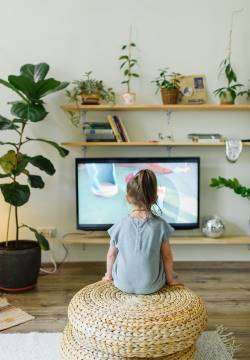Being a parent is hard work; that’s why it’s so important to have the right tools. Here are ten bad habits you need to break to become a better parent!
Not Listening When your Child Speaks.

I know; this one stinks. When you have a smart mouth three-year-old constantly telling you what to do, it’s easier to tune them out than to deal with the frustration they are certainly causing.
But, when you tune out your child when they talk to you, it shows that they aren’t important enough for you to listen when they speak up. It also sets an example that it’s okay not to listen and that their feelings might not be valid after all (you didn’t even wait for them to finish talking!).
They may end up internalizing these things and feeling like their opinions don’t matter unless someone is asking specifically about them. So instead of tuning out your children, try listening more closely – even if what they’re saying is annoying!
Speaking Negatively About your Child in Front of Others.
To me, this is the single biggest sign of a bad parent. Your child should be your top priority. If you’re spending time talking about how much they annoy you or how lazy they are in front of other people, that says to them that their feelings don’t matter and that it’s okay for others to talk badly about them too.
What would happen if your parents treated you like this? Would it make you feel loved and supported? I didn’t think so.
Negativity can find its way into conversations with friends and family, even when we’re not trying to hurt our children by doing so. As a parent, it’s important to break this habit immediately!
Breaking Promises to your Children.
This one is almost as important as not talking about them negatively in front of others, but for different reasons. As a parent, you must keep your promises to your children. If you say something will happen by a certain time and then don’t follow through on it, you’re teaching them that their trust can be broken and that life isn’t always fair. They might start to believe that the only thing they can count on is disappointment and resentment from those close to them.
When you tell your child that they can have ice cream after dinner or that you’ll take them to go get a toy, try keeping your word.
Otherwise, what are you teaching them about promises? That they’re only made to be broken and that it’s okay not to keep agreements? You should also never promise something that you know is just too hard for you to follow through on. Your kids will learn how to treat themselves with similar disregard if their parent isn’t giving them an example of how adults are supposed to act.
Making Excuses for Their Behavior.
I’ll be the first to admit that this is a really tough one. It’s so easy to tell your kids why they shouldn’t have done something or why it isn’t their fault, but sometimes you just have to accept responsibility for your actions. As parents, we want our children’s lives to be easier than our own.
We don’t want them to suffer, and we certainly don’t want others to notice when they’ve done wrong (after all, humiliation in front of others is never fun). But doing this actually has the opposite effect- it makes your child believe that they can get away with any behavior and that no one will ever hold them accountable for their actions.
They may also begin expecting people to shield them from adversity.
Making excuses for your child’s behavior may also send them the message that you don’t think they are capable of changing or learning from their mistakes. They might not take responsibility for their actions later in life either, which could affect both their relationships and their professional lives.
So next time you find yourself about to tell someone why something isn’t your child’s fault, remind yourself that it’s okay for kids to experience discomfort if they’ve done wrong.
Letting the TV Babysit for You.

As adults, we’re always busy doing something, and it’s understandable that finding time to play with your kids can be difficult. And while I know that sometimes you just get sick of playing the same games over and over, turning on the TV isn’t the answer!
This is especially true when you want some free time to veg out after a long day at work or if you’ve had a fight with your partner and don’t feel like dealing with family drama right now: this is not okay.
Kids learn from watching their mom and dad, so if they see you spending more time in front of the TV than parenting them, they might start getting ideas. A child who watches too much television takes longer to develop good communication skills because they can’t interact with people realistically.
They also have more difficulty learning how to play on their own because they are used to depending on the TV for entertainment.
Also, you must put down the phone and have a conversation with them every day.
This will help them feel important and heard, and it will give you a chance to find out what’s going on in their lives.
If you are spending more time on your phone than with your kids, they might interpret this as being unimportant to you. They will develop the belief that their needs are less important than yours and that they have no value in society because people only care about what’s happening on their phones.
Don’t worry- I’m not saying ditch all of your friends! But if you want to have a healthy relationship with your children, it is important to set aside some time each day for them. And if that means turning off the TV or putting down the phone, do it! Your children will be happier without all of these electronic distractions poisoning their lives. Don’t forget how much fun parenting can be!
Not Having Realistic Expectations of your Children.
Parents sometimes expect too much from their children and can be disappointed when they don’t meet these unrealistic expectations. This is especially true when it comes to raising girls, whose parents often feel the need to please everyone. Parents who have these high expectations for their children tend to pressure them and often take it personally when they aren’t able to meet them.
Don’t burden your kids with responsibilities too young. Don’t get me wrong: I don’t think young children should be sitting around doing nothing all day or being treated like little adults. They should be allowed to enjoy their childhood as much as possible, even if that means their responsibilities are limited to things like feeding the dog or taking out the garbage.
Children who feel responsible for these types of tasks later in life will be more self-sufficient and won’t expect other people to do everything for them. It’s important not to make a lot of big chores a requirement for a child unless they really want to do something on their own.
But asking your kids too much can sometimes make them feel that they have failed you in some way when they don’t meet your expectations.
Comparing your children will only make you see them as failures. And honestly, if you compare your child to other people’s kids, you are setting yourself up for disappointment. It is amazing how much the comparison game can poison a happy family life.
Not Being Consistent with Discipline.
If you are inconsistent with your discipline methods, your child will be confused and won’t learn how to behave properly. If you get angry when they misbehave but then turn right around and do the same thing that made them mad in the first place, they won’t understand why it’s wrong.
This can make them more likely to repeat bad behavior because they don’t know if their parents are serious or not about these things. I’m sure you don’t want to teach your children that lesson, so it is important for you to stay on track with what is acceptable behavior in your home and what isn’t.
Consistency in discipline is an important part of raising children, so they learn how to behave correctly, but it doesn’t have to involve physical punishment. Parents who use negative reinforcement only are setting themselves up for trouble later on because children will often begin testing limits if they know that there aren’t any consequences for their actions.
At the same time, you should avoid being too lenient with your kids, or they might begin misbehaving without knowing there are consequences at all. This means it’s important to teach appropriate behavior through positive encouragement rather than disciplining them every time they do something wrong. It’s also important to remember that children need clear boundaries, but they should be flexible enough to accommodate changes in their daily routines.
Feeling Guilty when Saying No.

Sometimes it’s a challenge to say no to a child, but doing so can be beneficial for the whole family. If you are too lenient with your children and tend to give in every time they ask for something, you might have trouble getting them to listen when you want them to do something on their own. This can be especially problematic as parents get older and busier because it won’t be as easy as before for them to say yes all of the time.
The main reason that saying no is important is that it teaches kids how to deal with disappointment, which is an important life lesson. By being able to manage these feelings instead of instantly giving a child what they want, parents will a good example for their growing
Parents often give in to their children’s demands, and it causes them problems later on.
Even if you don’t think saying no to your kids is a big deal, they need to learn that their requests won’t always be met with compliance. If they get used to getting what they want every time, whining and making you look like the bad guy will only make things harder for everyone.
They also need to understand that sometimes there are rules in place for very good reasons, and these rules shouldn’t be ignored just because they don’t want to follow them.
When you let your kids get away with stuff like this, it tells them that boundaries aren’t necessary and that the people around them should do whatever makes them feel instead of putting others first or thinking about what is best for the whole family.
It can ultimately put you in an awkward situation because they will continue pushing limits until they learn that there are consequences when they don’t behave. If you want to lay down some rules and your child doesn’t immediately comply, they need to understand that their actions have real-life consequences.
It’s important to remember that kids need guidance and the chance to learn how to make good choices. This doesn’t mean you should treat them like adults, but it does mean that letting your kids make decisions on their own is an important part of helping them grow up.
Yelling at or Punishing your Kids when you are Angry.
When you’re angry, it’s important to take a step back and calm down before you do anything. Yelling or punishing your kids when you’re mad will only make things worse, and it will damage your relationship with them.
If you’re feeling overwhelmed or frustrated, it’s best to take some time for yourself so you can cool down. Once you’ve had a chance to relax, you can talk to your kids about what happened and why you were angry. This will help them understand what they did wrong and how they can avoid making the same mistake in the future.
Punishing your kids when you’re angry is never a good idea because it will only make them resent you. Not only that, but it can also damage your relationship with them by making them feel like they’re the ones in trouble, not their actions. When you yell at or punish your kids when you are angry, there is a good chance that they won’t remember what it was that made you so mad or why they should try to avoid doing it again.
Not Letting them Make their Own Decisions.

Giving your children a sense of control over their lives can be very beneficial because it will help them feel like they’re in charge of their destiny. As they get older, this will mean that they are more likely to take on responsibilities and make good decisions on their own.
Allowing kids to make choices for themselves also helps them develop a sense of self-identity, which is something that is essential for healthy psychological development. When you give them the opportunity to explore different aspects of their personality, it will help them figure out who they are and what they want in life.
This doesn’t mean you have to let your kids do whatever they want or that you should never set rules for them – on the contrary, you should be setting boundaries and expectations from an early age, but you need to make sure they know that you trust them to make the right choices. If your children never get a chance to make decisions on their own, they might feel like adults are always telling them what to do, and this can end up driving them away.
Conclusion.
As a parent, you never stop learning. You can’t expect to know everything or be perfect at parenting all the time. That’s why it is important to make mistakes and learn from them in order to become better parents to our children. What are some of the bad habits that you need to break? Let us know in the comments section below!
For more information on how to deal with common parenting issues, please visit the following article: 10 Parenting Mistakes That You Must Avoid

Meet Brenda Tillman: your go-to expert in Cognitive Behavioral Therapy! Not only is she a seasoned therapist, but she’s also a passionate mom blogger who never misses a beat. Dive deep into her insightful blogs, backed by her extensive coursework in Parenting Skills, Learning, and Education. Brenda’s heartwarming family – a son, two daughters, and their adorable pets – often take center stage in her writings. From parenting hacks and relationship tips to health & fitness nuggets, Brenda has been enlightening her readers for over half a decade. Stick around, and you’re bound to discover gems from a mom who wears many hats with grace!
Reviewed By: Joanna Perez and Marcella Raskin
Edited By: Lenny Terra
Fact Checked By: Gabrielle J. Smith
Photos Taken or Curated By: Matthew Mansour